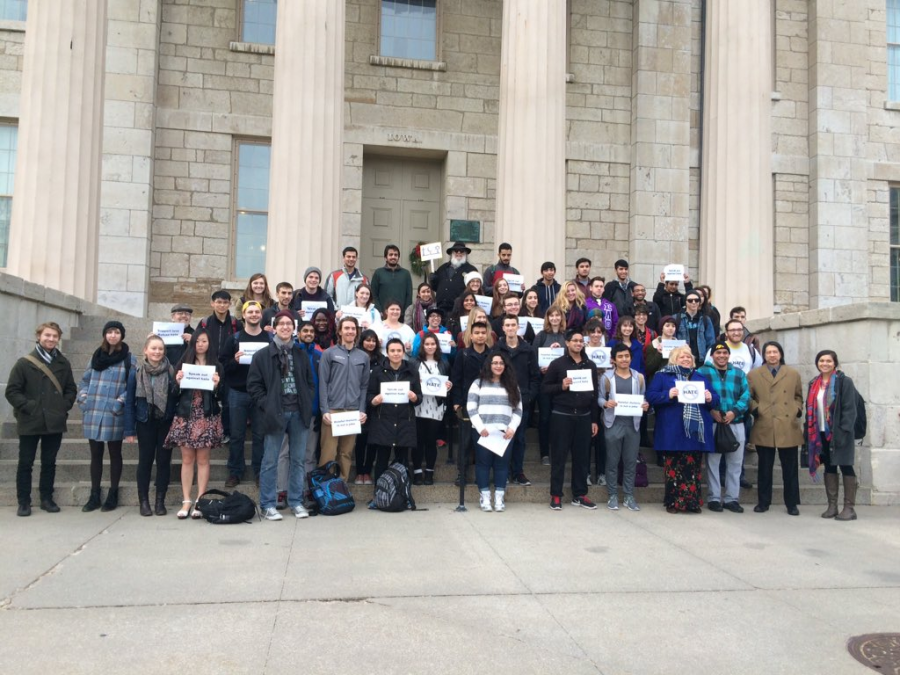By Cindy Garcia
Some students on campus are acting against what they say is hateful rhetoric in political campaigns and the media.
A group largely gathered through a Facebook event page stood near the Pentacrest on Dec. 11, carrying signs that read “hateful rhetoric is not a joke” and “speak out against hate.”
Attendees shared personal stories and advice on how to lobby against what they believe is hate directed toward marginalized groups, including Muslims, Latinos, African Americans, Asians, people with disabilities, and refugees.
UI student Brad Pector said he came up with the idea of having a rally after observing Islamophobia online and in the news. Republican presidential candidate Donald Trump has attracted widespread attention and controversy for his proposal to block Muslims from entering the United States.
“I was just thinking about the daily life of a Muslim student on campus here and how difficult it must be — just coping with all those things and being afraid on campus about other people acting out,” he said.
The group’s Facebook page received comments accusing the rally of smothering First Amendment rights.
Gada Herz, one of the event’s organizers, said she hoped people who intone the First Amendment to spread hateful comments were more open to new ideas.
“I would personally say they do have the right to say that, but just having the right to say something doesn’t make it the right thing to say,” she said. “If you really hate Muslims and you haven’t talked to one before, that’s probably an issue right there, because you shouldn’t hate someone you’ve never interacted with.”
Many of the event’s attendees emphasized the power of social media to act against hate. Herz said future plans for the group are an “open book,” in which individuals could potentially band together to undertake different ideas.
Carter Yerkes, speaking on behalf of the UI Students for Human Rights, also implored attendees to speak out whenever prejudice occurs on campus.
“We urge you to broaden your horizons whenever possible” he said. “Get to know classmates with different backgrounds. Together, we can reverse this spread of Islamophobia and xenophobia. Please remember, terrorism has no religion.”
Joy Beadleston, an attendee and community member, told the group about her middle name, Shaffea, which was the name of her great grandmother, an Arabic word for “healer of people.”
Beadleston said her family came to United States and built the “Mother Mosque” in Cedar Rapids. The mosque was built in 1934 and is part of the National Register of Historic Places.
Beadleston insisted Iowa has always been welcoming to refugees, a trend that should continue in light of the Syrian refugee crisis.
“I thought it was important, you know, as a person of the fourth generation, to say we’ve been here a long time, and we’ve done well, and we’ve helped the community a lot. The Iowa community,” she said.
In the past, Muslim community members have been told to keep silent about the hateful remarks and actions they receive, but silence isn’t working anymore, Beadleston said.
“It’s almost like people are trying to force us to be shamed and we don’t want to be shamed,” she said. “We’re proud to be American.”



